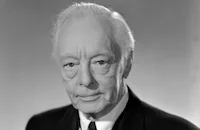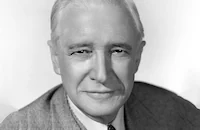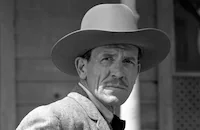We've Never Been Licked
Brief Synopsis
Cast & Crew
John Rawlins
Richard Quine
Anne Gwynne
Martha O'driscoll
Noah Beery Jr.
William Frawley
Film Details
Technical Specs

Synopsis
The "Army Hour" radio program honors the new graduates of Texas A & M who are preparing to join the United States Armed Forces. Many of the school's alumni, such as Colonel Jason "Cannonball" Craig, listen to the broadcast from their stations in the South Pacific. Radio announcer Bill Stern then tells the story of Brad Craig, Jason's son, who first attended Texas A & M in 1938: On the train to the college, Brad meets and falls for Nina Lambert, the granddaughter of chemistry professor "Pop" Lambert. Brad has a hard time adjusting to the rigors and traditions of the military school, despite the constant counsel of his roommate, Cyanide Jenkins. Bill tells Pop that he plans to quit college and return to his home in the Philippines, but the professor convinces him to stay. Later, at a late-night pep rally, Bill meets and quickly becomes friends with two Japanese students, Matsui and Kubo. Brad and Nina date for his first two years at the college, though she and Cyanide soon fall in love. The two finally admit their true feelings to each other at a ball, but, out of loyalty to Brad, they remain only friends. As the United States prepares for war in the South Pacific, Brad receives the ire of his fellow cadets for his continuous support of the Japanese. Brad's mind is changed, however, when he sees photographs of the atrocities committed by the Japanese in China. At the beginning of his senior year, Brad is accused of helping Matsui and Kubo steal a secret formula from Pop's laboratory, though he is only pretending to be a traitor and actually gives the Japanese spies a counterfeit formula. Brad is soon forsaken by his fellow cadets, then expelled from the college. After the attack on Pearl Harbor, Brad goes to Japan, where he performs on anti-American radio broadcasts. Prior to the Japanese attack on the Solomon Islands, Brad is taken aboard a Japanese aircraft carrier, then is assigned an airplane so that he can report on the battle from the sky. Seeing his window of opportunity, Brad kills his Japanese pilot, then radios the American flyers, who include Cyanide, of the position of the Japanese fleet. The Americans win the sea battle with further help from Brad, who commits suicide by crashing his plane onto the deck of a Japanese carrier. As the "Army Hour" radio broadcast ends, Brad is posthumously awarded the Congressional Medal of Honor for his self-sacrifice, and his father listens with pride to the ceremony.

Director
John Rawlins
Cast

Richard Quine

Anne Gwynne

Martha O'driscoll
Noah Beery Jr.

William Frawley
William Blees

Harry Davenport
Edgar Barrier

Samuel S. Hinds

Moroni Olsen
Roland Got
Allen Jung

Bob Mitchum
Alfredo Desa
Bill Stern
George Putnam
Malcolm Mctaggart

Paul Dubov
Dick Chandlee
David Street
Michael Moore
Danny Jackson
Roger Daniel
Dick Morris
Herbert Gunn
Henry Rogers
John Forrest
William Lechner
Bob Lowell
Michael Towne
Bill Nash
Jackie Ray
Jack Edwards Jr.
Ward Wood
Gordon Wynne

Cliff Robertson
Bill Walker

Kenneth Macdonald
Dean Benton

Mantan Moreland
Frank Tang
John Frazer
Henry Hall
Phil Warren
William Ruhl
Kendall Bryson
Franco Corsaro
Walter Bonn
Beal Wong
Sammy Mckim
John James
Don Mcgill
Bruce Wong
Alex Havier

Paul Langton
Crew
Col. J. K. Boles U.s. Army
Bernard B. Brown
Philip Cahn
Ken Darby
Richard J. Dunn
William Fox
Fred Frank
John P. Fulton
Alexander Golitzen
John B. Goodman
Nick Grinde
Franz Gruber
Vernon Keays
William J. Kelly
Milton Krasner
Gene Lewis
Jack H. Littlejohn
Charles A. Marshall
Marvin H. Mimms
Joseph Mohr
Lil Munnerlyn
Jacques Offenbach
Charles Previn
Norman Reilly Raine
Norman Reilly Raine
Harry Revel
Frank Skinner
Henry Spitz
Lt. Commander John S. Thach U.s.n.
William Tummel
Walter Wanger
Walter Wanger
Paul Francis Webster
Vera West
J. V. "pinky" Wilson

Film Details
Technical Specs

Quotes
Trivia
A stunt player was killed when the caisson he was riding on flipped over.
Notes
The working title of this film was Texas Aggies. The opening credits include the following written statement: "With appreciation to the staff and student body of the Agricultural and Mechanical College of Texas whose cooperation made this picture possible." The opening credits also state that the final battle sequence was "made with the cooperation of the Navy Department." The film then opens with the following written dedication: "This motion picture is dedicated to the thousands of Texas A. & M. college students who participated in the making of this picture and who are now serving their country on many battlefronts all over the world."
The Variety review for this film mistakenly states that Anne Gwynne's character "Nina Lambert" is the daughter of "'Pop' Lambert," played by Samuel S. Hinds, though she is clearly referred to numerous times in the film as his granddaughter. Hollywood Reporter news items report that large portions of the film were shot on location in College Station, TX, the home of Texas A & M. According to Hollywood Reporter, actor Richard Quine replaced Robert Cummings in the role of "Brad Craig" because Cummings' duties with the Civil Air Patrol did not allow him to leave the Southern California area for the required location shooting in Texas. Hollywood Reporter news items state that Rex Bell and James Brown were considered for roles in We've Never Been Licked, but neither actor appeared in the film. Hollywood Reporter also reported that Texas governor Coke Stevenson and Texas A & M president T. O. Walton, as well as actor Dick Foran, were cast in the film, but their appearances in the released film have not been confirmed.
Upon the conclusion of filming We've Never Been Licked, Universal and began a contract dispute with actress Martha O'Driscoll. According to Hollywood Reporter, O'Driscoll was signed in February 1943 to a Universal contract based on her performance in this film. In March 1943, however, O'Driscoll began proceedings to void her contract with the studio, arguing that her mother had signed the contract before she turned twenty-one years of age, and thus, the contract was void under California state law because the proper legal procedures for such a contract had not been followed. In early April 1943, Hollywood Reporter news items stated that O'Driscoll's contract with Universal had been ruled invalid.












